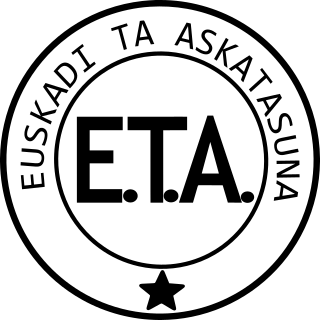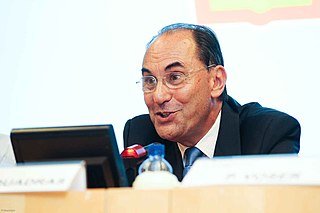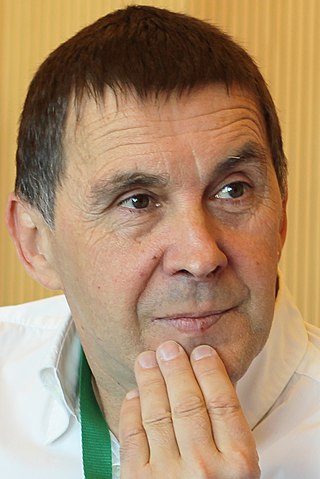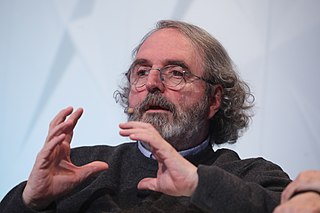
ETA, an acronym for Euskadi Ta Askatasuna, was an armed Basque nationalist and far-left separatist organization in the Basque Country between 1959 and 2018, with its goal being independence for the region. The group was founded in 1959 during the era of Francoist Spain, and later evolved from a pacifist group promoting traditional Basque culture to a violent paramilitary group. It engaged in a campaign of bombings, assassinations, and kidnappings throughout Spain and especially the Southern Basque Country against the regime, which was highly centralised and hostile to the expression of non-Castilian minority identities. ETA was the main group within the Basque National Liberation Movement and was the most important Basque participant in the Basque conflict.

The 2004 Madrid train bombings were a series of coordinated, nearly simultaneous bombings against the Cercanías commuter train system of Madrid, Spain, on the morning of 11 March 2004—three days before Spain's general elections. The explosions killed 193 people and injured around 2,050. The bombings constituted the deadliest terrorist attack carried out in the history of Spain and the deadliest in Europe since 1988. The attacks were carried out by individuals who opposed Spanish involvement in the 2003 US-led invasion of Iraq.

AlejoVidal-Quadras Roca is a Spanish former politician and radiation physicist. Born in Barcelona, he served as a Member of the European Parliament from 1999 to 2014 and served as First Vice President of the European Parliament from 2004 to 2007.

Arnaldo Otegi Mondragón is a Basque politician who is currently General Secretary of Basque nationalist party EH Bildu. He was member of the Basque Parliament for both Herri Batasuna and Euskal Herritarrok. He was a convicted member of the banned armed separatist group organization ETA in his early years. He was one of the key negotiators during the unsuccessful peace talks in Loiola and Geneva, in 2006.
Iraultza was a small Basque militant armed group of leftist tendency, active between 1982 and 1996 as a response to the suppression of the Basque resistance movement. It was thought to be a group of less than 50 people based in Bilbao, largely focused on the destruction of property, particularly those of American multinational corporations and against other smaller Spanish companies involved in labor disputes, in support of Workers' self-management and mobilization, although one of its attacks was responsible for the death of one individual and several for minor injuries of others. According to newspaper El País it was thought to be responsible for over 210 attacks during its existence.

Jon Juaristi Linacero is a Spanish poet, essayist and translator in Spanish and Basque, as well as a self-confessed former ETA militant. He lives in Madrid.

The Association of Victims of Terrorism is a Spanish association created in 1981 by victims of terrorist attacks. Its members include those injured by ETA, GRAPO, the Provisional Irish Republican Army and Al Qaeda, as well as their families. It does not, however, include victims of extreme right Spanish groups such as GAL, Warriors of Christ the King and others. Its membership exceeds 6,000.

On December 30, 2006, a van bomb exploded in the Terminal 4 parking area at the Madrid–Barajas Airport in Spain, killing two and injuring 52. On January 9, 2007, the Basque nationalist and separatist organisation ETA claimed responsibility for the attack. The attack, one of the most powerful carried out by ETA, damaged the airport terminal and destroyed the entire parking structure. The bombing ended a nine-month ceasefire declared by the armed organisation and prompted the government to halt plans for negotiations with the organisation. Despite the attack, ETA claimed that the ceasefire was still in place and regretted the death of civilians. The organisation eventually announced the end of the ceasefire in June 2007.

Agustín Ibarrola was a Spanish painter and sculptor.

José Antonio Urrutikoetxea Bengoetxea, also known as Josu Urrutikoetxea, Josu Urrutikoetxea Bengoetxea, and by the nickname Josu Ternera, is a former member of the Basque separatist organization ETA. In separate trials over a number of years, he was convicted for his involvement in the 1986 Plaza República Dominicana bombing and the 1987 Zaragoza barracks bombing, which together killed 23 people.
José Antonio Gurriarán was a Spanish journalist and assistant director of the Pueblo newspaper. He was the founder of the second chain of Canal Sur.
ETA's 2006 "permanent ceasefire" was the period spanning between 24 March and 30 December 2006 during which, following an ETA communiqué, the Spanish government, led by José Luis Rodríguez Zapatero on one side, and the militant group on the other, engaged in talks as a means to agree on a formula to voluntarily disband the latter. It was terminated as a result of the 2006 Madrid Barajas International Airport bombing.
The 2009 Palma Nova bombing occurred on July 30, 2009, when a limpet bomb went off outside a Civil Guard barracks in the town of Palma Nova, Majorca, Spain. The bomb was placed under a patrol car and two Civil Guard officers died as a result of the explosion. A second device was found under another Civil Guard vehicle at nearby barracks and safely exploded by police. On August 9, the Basque nationalist and separatist organisation ETA claimed responsibility for the attack, while four other bombs exploded around restaurants and shopping centres in Palma, Majorca, causing no injuries.

A van bomb went off on 19 May 2008 outside a boat club in the town of Getxo, Biscay in the Basque Country, Spain. The attack caused serious damage to the club, as well as nearby buildings and structures. No one was killed or injured after a warning call from the Basque separatist organisation ETA. On 31 May, the organisation claimed responsibility for the bombing.
Cambio 16 is a Spanish language monthly current affairs magazine published in Madrid, Spain, by "Group 16".
Flavio Signore is a producer, filmmaker, reporter, educator and manager of international cooperation programs. He produces documentary films and news, coordinates projects for armed conflict victim relief based on art therapy and education.
José Luis López de Lacalle Arnal was a Spanish journalist and trade unionist. A columnist for El Mundo newspaper, he was killed by ETA.
José Tomás Larrañaga Arenas was a Spanish politician who was assassinated by the ETA.
Francisco Javier García Gaztelu, alias "Txapote", is a Basque separatist militant who is responsible for the assassination of several Basque politicians. He is also known by the aliases Perretxiko, Jon, Xabier, and Otsagi, among others. He was part of the "hard wing" of ETA and never showed any sign of repentance for his actions or condemned those of the group.










